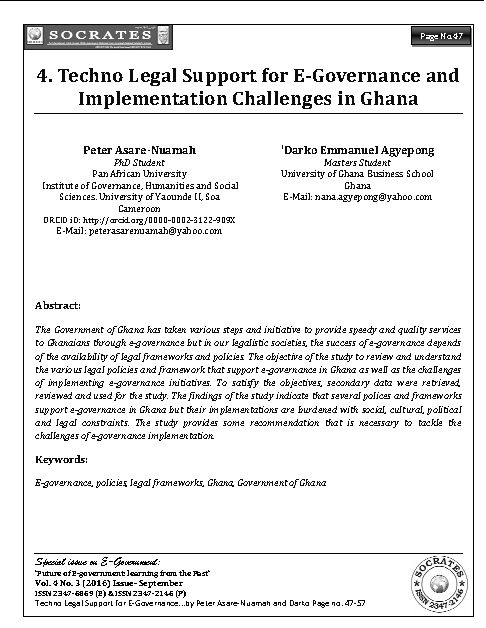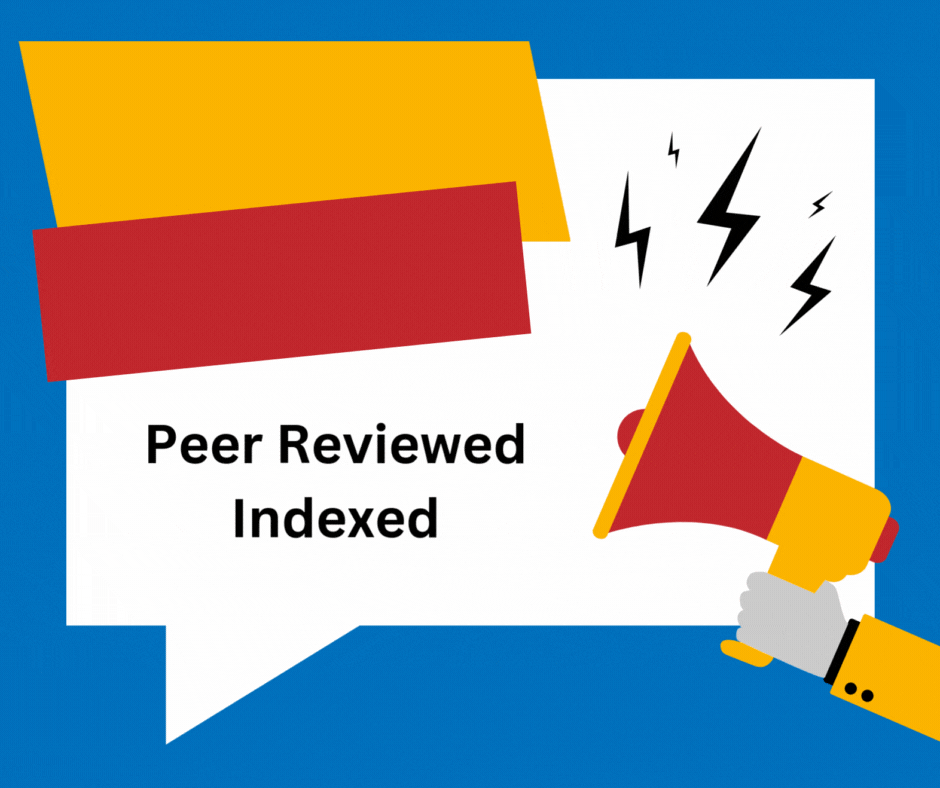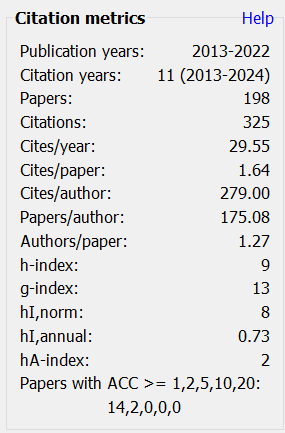Techno Legal Support for E-Governance and Implementation Challenges in Ghana
Keywords:
E-governance, policies, legal frameworks, Ghana, Government of GhanaAbstract
The Government of Ghana has taken various steps and initiative to provide speedy and quality services to Ghanaians through e-governance but in our legalistic societies, the success of e-governance depends of the availability of legal frameworks and policies. The objective of the study to review and understand the various legal policies and framework that support e-governance in Ghana as well as the challenges of implementing e-governance initiatives. To satisfy the objectives, secondary data were retrieved, reviewed and used for the study. The findings of the study indicate that several polices and frameworks support e-governance in Ghana but their implementations are burdened with social, cultural, political and legal constraints. The study provides some recommendation that is necessary to tackle the challenges of e-governance implementation.
Downloads
Metrics
References
Bhatnagar, S. (2014). Public Service Delivery: Role of Information and Communication Technology in Improving Governance and Development Impact. Asian Development Bank. Retrieved from http://www.adb.org/publications/public-service-delivery-role-information-and-communication-technology-improving-governance
Boateng, R. (2012). The challenges of taking baby steps: advancing e-governance beyond readiness in Sub-Sahara Africa. Available at; http://portal.unu.edu/calendar/?go=event.page&id=4988
Bonsu, K.W. (2012). A comprehensive review of the policy and programmatic response to chronic non-communicable disease in Ghana. Ghana Medical Journal; 46
Dye, T. R. (2016) Understanding Public Policy, 15th ed. Pearson.
European Commission (2009). A knowledge intensive future for Europe, Expert Group Report (October, 2009). Brussels: EU, European Research Area, Research Policy.
European Commission (2009). Towards the future internet: A European research perspective. In G. Tselentis (Ed.), IOS Press.
European Commission, DG Research (2009). C(2009) 5893 of 29 July 2009. Available at ftp://ftp.cordis.europa.eu/pub/fp7/ict/docs/ict-wp-2009-10_en.pdf.
Gupta M.P. & Jana D. (2003). E-governance evaluation: a framework and case study Government Information Quarterly 20 (2003) 365-387
Hwang, M.S., Li, C.T., Shen, J.J., and Chu, Y.P. (2004). Challenges in government and security of information. Information & security. Int. J. 15 (1), 9–20.
Lindblom, C. E. and Woodhouse, E J. (1993). The Policy Making Process, 3rd ed. Englewood Cliffs, N.J.: Prentice Hall. pp. 10-12
Ministry of Communications, Ghana. (2004). National Telecommunications Policy. Retrieved from http://www.nca.org.gh/downloads/Ghana_Telecom_Policy_2005.pdf
Ministry of Education, Republic of Ghana. (2008). ICT in education policy. Retrieved from http://www.moe.gov.gh/assets/media/docs/ICTinEducationpolicy_NOV2008.pdf
Ministry of Education, Republic of Ghana. (2011). Draft ICT in education strategic implementation plan Ghana. Retrieved from http://www.slideshare.net/sqjafery/draft-ict-in-education-strategic-implementation-plan-ghana20110715
Ministry of Health, Ghana. (2010). National E-Health Strategy. Retrieved from http://www.moh-ghana.org/UploadFiles/Publications/Ghana_E-Health120504121543.pdf
Ministry of Local Government, Rural Development and Environment, Ghana. (2008). Government of Ghana: Intergovernmental Fiscal Decentralisation Framework. Retrieved from http://www.giz.de/en/downloads/en-intergovernmental-fiscal-decentralisation-framework.pdf
Misuraca, G., Broster, D & Centeno C. (2012). Digital Europe 2030: Designing scenarios for ICT in future governance and policy making. Government Information Quarterly 29 (2012) S121–S131
National Communication Authority, Ghana. (2003). The Ghana ICT for Accelerated Development (ICT4AD) Policy. Retrieved from http://www.nca.org.gh/downloads/Ghana_ICT4AD_Policy.pdf
National Communication Authority, Ghana. (2008a). Electronic Communication Act 775. Retrieved from http://www.nca.org.gh/downloads/regdocs/NCA_Electronic_Communications_Act_775.pdf
National Communication Authority, Ghana. (2008b). Electronic Transactions Agency Act 772. Retrieved from http://www.nca.org.gh/downloads/regdocs/NCA_Electronic_Transactions_Act_772.pdf.
National Communication Authority, Ghana. (2008c). National Communication Authority Act 769. Retrieved from http://www.nca.org.gh/downloads/regdocs/Ghana_National_Communications_Authority_Act_769.pdf
National Information Technology Agency, Ghana. (2008). National Information Technology Agency Act 771. Retrieved from http://www.nita.gov.gh/sites/default/files/resources/Ghana_National_Information_Technology_Agency_Act_771.pdf.
National Information Technology Agency, Ghana. (2014). Ghana e-Government Interoperability Framework. Retrieved from http://www.nita.gov.gh/sites/default/files/resources/EA%20&%20eGIF%20Main%20Doc/eGovernment%20Interoperability%20Framework.pdf
National Information Technology Agency, Ghana. (2015). E-Government Network Infrastructure. Retrieved from http://www.nita.gov.gh/eGovernment-Network-Infrastructure
Norris, P. (2001). Digital Divide: Civic Engagement, Information Poverty, and the Internet Worldwide. Cambridge?; New York: Cambridge University Press.
Rubel, T. (2014). Smart government: Creating more effective information and services. Retrieved from http://www.govdelivery.com/pdfs/IDC_govt_insights_Thom_Rubel.pdf
Sharon, S.D. (2008). The evolution and continuing challenges of e-governance. Public Administration Review, Vol. 68. Available at; http://www.jstor.org/stable/25145732. Retrieved on Sat, 17 Jan 2015 23:50:32 PM
United Nations. (2014). United Nations e-Government Survey 2014: E-Government for the Future We Want. New York: United Nations.
United Nations. (2010). World E-government ranking. Retrieved from http://www.unpan3.un.org/egovkb/Portals/egovkb/Documents/un/2010-Survey/Chapter-4-World-e-government-rankings.pdf .
United Nations. (2008). United Nations e-Government survey 2008: From E-Government to Connected Governance. Retrieved from http://unpan1.un.org/intradoc/groups/public/documents/un/unpan028607.pdf
Wimmer, M. and Bredow, B.V. 2002. A Holistic approach for providing security solutions in e-government. In: 35th Hawaii International Conference on System Sciences. Big Island of Hawaii, pp. 1715– 1724. <http://www.it4sec.org/node/1340>.

Downloads
Published
How to Cite
Issue
Section
Categories
License
Copyright (c) 2016 Asare-Nuamah Peter, Agyepong ‘Darko Emmanuel

This work is licensed under a Creative Commons Attribution-NonCommercial 4.0 International License.
Revised Copyright/CC license that applies to all the articles published after 05-02-2017
Attribution-NonCommercial 4.0 International (CC BY-NC 4.0)

Copyright/CC license that applies to all the articles published before 05-02-2017
Attribution-Non Commercial-No Derivatives 4.0 International (CC BY-NC-ND 4.0)

Author(s) will retain all the right except commercial and re-publishing rights. In the case of re-publishing, they will have to obtain written permission from the journal. Additional licensing agreements (Creative Commons licenses) grants rights to readers to copy, distribute, display and perform the work as long as you give the original author(s) credit, they can not use the works for commercial purposes and are not allowed to alter, transform, or build upon the work. For any reuse or distribution, readers and users must make clear to others the license terms of this work. Any of these conditions can be waived if you get permission from the copyright holders. Nothing in this license impairs or restricts the authors’ rights. To view a copy of this license, visit http://creativecommons.org/licenses/by-nc-nd/4.0/ or send a letter to Creative Commons, 171 Second Street, Suite 300, San Francisco, California, 94105, USA.
Research Papers published in SOCRATES are licensed under an Attribution-NonCommercial-NoDerivatives 4.0 International (CC BY-NC-ND 4.0)












